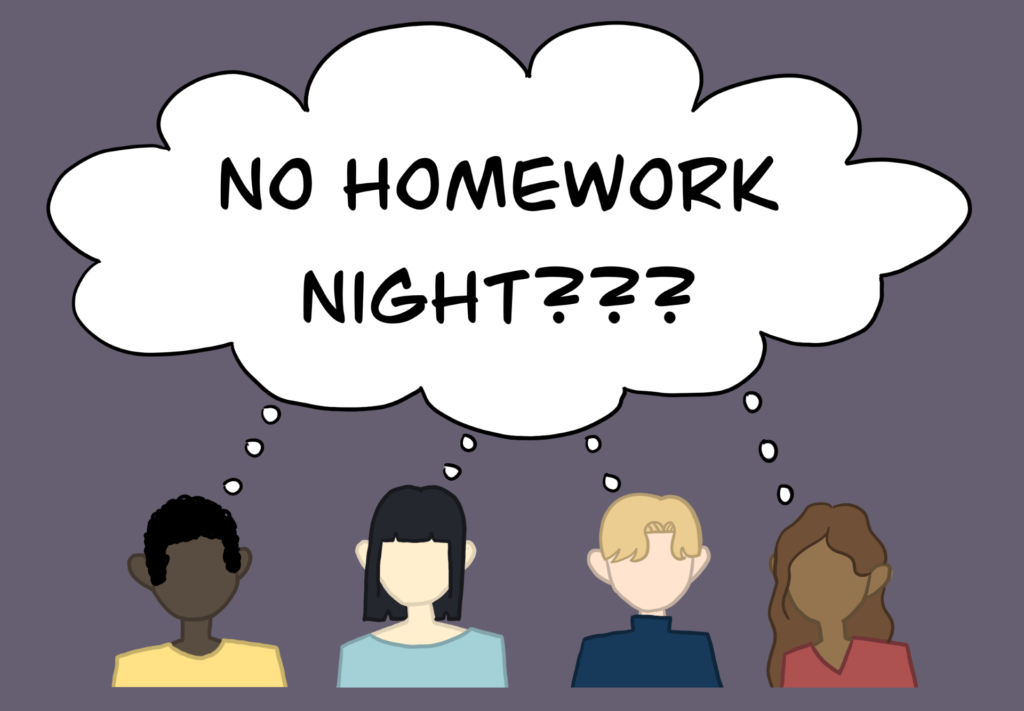
By Francesca Howard ’26
To emulate the days off from school that students in several school districts in Connecticut get on holidays such as Yom Kippur and Diwali, Choate implemented no-homework-nights into the yearly calendar. For the most part, these nights fall on various religious and cultural holidays throughout the year. They are designed to be a welcomed reprieve from quadratic equations, Shakespearean soliloquies, and electron configurations, as well as a designated time for students to engage with their family, faith, and other pursuits.
As the clock struck 8:00 p.m. in Memorial House’s (Mem’s) common room on our most recent no-homework night, one might have expected students to be on the phone with their families or celebrating their holidays with one another. Yet, the activities in the room were no different than any other school night. Students were either scribbling or typing furiously away at their screens. That same ticking of the clock was drowned out by the tapping of keyboards, flipping of a page, and occasional sighs.
For a night designated to be one without homework, the ambiance of Mem’s common room seemed anything but. The residents were unquestionably not celebrating their respective holidays and were in fact, doing homework.
I was baffled as to why this was the case; teachers are not allowed to assign homework on these nights, so why are all these students still buried in their schoolwork?
That night, I realized that no-homework nights are in fact, a hoax. I, along with several of my peers, feel like many teachers who claim to follow the policy wind up assigning twice as much homework the following day. “My teachers cram everything due to the night after so I have to spread out my work and start it the night before,” Genesis Torres ’26 said.
Suleika Sandi ’26 agreed, explaining that “they assign extra work for the next time we have class, assuming the no homework night will give us time to do it, so that the class won’t get left behind.”
Instead of spending time with their families and observing their religious traditions, students are slammed with late-night cramming before their upcoming calculus test, article on the history of U.S. foreign policy, and French essay, all of which require a concerning amount of time, coffee, and Celsius.
Students have received optional homework on these nights to consolidate their understanding from the class; not completing these assignments would leave a gap in their knowledge. All in all, delaying work does not lessen its burden. But, this was no shock to me as a second-year student at Choate who has had her fair share of not-so-no-homework nights. I recall the first of these alleged nights without work during my freshman year: I nestled into my favorite reading nook with a new novel, appreciative of the Administration’s attentiveness to the needs of the student body. This was my chance to catch up on sleep, grab dinner in town with friends, and write my grandmother the letter I promised her. But the canvas assignments that loomed on my dashboard told a different story. A deluge of assignments awaited.
Ever since that day, I have spent my no-homework nights — like those in the Mem common room the other night — working. Ironic, isn’t it? The few nights a year when Choate tries to give no homework to observe religious holidays, my peers and I have just as much work to do.
This policy was instituted to allow students to fully engage in their communities and cultures without the pressure of assignments but obligations don’t disappear if they are just shifted to a different day. Students will complete the work one way or another.
With this in mind, it is imperative that teachers abide by the intentions of no-homework nights. It’s time for Choate to recalibrate its approach to this initiative to ensure students have the balance they deserve. This issue is one we can no longer ignore; the flaws in this policy’s implementation should be addressed and amended.
If Choate truly wants to give its students time off on these occasions, it must set aside time in more than name only. Conceptually, no-homework nights are a policy most of our community can support, but it needs adjusting to be as beneficial as it intends to be.




